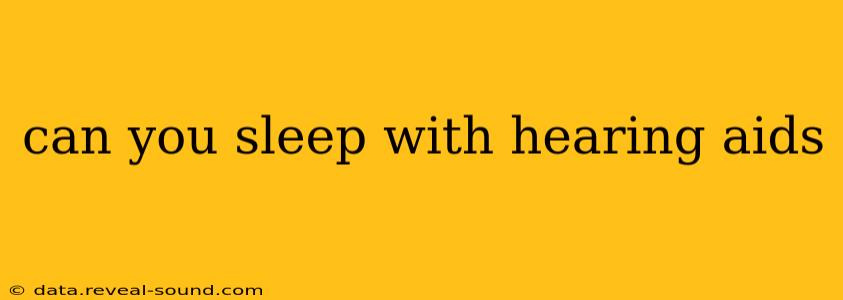Can You Sleep With Hearing Aids? A Comprehensive Guide
The question of whether or not you can sleep with hearing aids is a common one, and the answer isn't a simple yes or no. It depends on several factors, including the type of hearing aid you have, your personal comfort level, and your sleeping habits. This comprehensive guide will explore the pros and cons, addressing common concerns and offering helpful advice.
Understanding Different Hearing Aid Types and Their Suitability for Sleeping
Before diving into the specifics, it's crucial to understand that hearing aids come in various styles, each with its own characteristics that impact sleep comfort:
-
Behind-the-Ear (BTE) Hearing Aids: These are typically larger and more noticeable. Sleeping with BTEs can be uncomfortable for some, potentially causing pressure points or discomfort during tossing and turning.
-
In-the-Ear (ITE) Hearing Aids: These are custom-fitted to the ear canal. While smaller than BTEs, they still might be uncomfortable for some sleepers.
-
In-the-Canal (ITC) and Completely-in-Canal (CIC) Hearing Aids: These are the smallest styles and are often considered the most comfortable for sleeping, as they are less noticeable and less likely to cause pressure points. However, even these can present challenges for some.
-
Hearing aid features: Modern hearing aids often have rechargeable batteries. Sleeping with the device may depend on charging needs. Some newer hearing aids even offer a sleep mode to conserve power or reduce background noise interference.
Can I damage my hearing aids if I sleep with them?
This is a legitimate concern. While many modern hearing aids are durable, sleeping with them increases the risk of damage. Accidental breakage from rolling over onto them, or exposure to sweat and oils overnight, can reduce their lifespan and necessitate costly repairs or replacements. Furthermore, the hearing aid's delicate components could be damaged from the pressure exerted during sleep.
What are the potential benefits of sleeping with hearing aids?
For some individuals, particularly those with significant hearing loss, the benefits of sleeping with hearing aids outweigh the risks. These benefits might include:
-
Improved awareness of environmental sounds: This can be crucial for individuals who need to be alerted to sounds such as smoke alarms or a crying baby.
-
Enhanced feelings of security: Knowing that you'll hear important sounds during sleep can provide a sense of security for some individuals.
-
Consistent hearing support throughout the day: This is especially beneficial for individuals whose hearing loss significantly impacts their daily lives.
What are the potential drawbacks of sleeping with hearing aids?
The potential drawbacks are significant and need careful consideration:
-
Discomfort and sleep disruption: Pressure points, irritation, and general discomfort can significantly disrupt sleep quality.
-
Increased risk of damage or loss: As mentioned earlier, the risk of damage or even losing a hearing aid while sleeping is substantial.
-
Hygiene concerns: Sweat and oils from the ear can accumulate on the hearing aid, potentially causing damage or requiring more frequent cleaning.
-
Battery life considerations: If you have a rechargeable model, you might need to adjust your charging routine.
What are the alternatives to sleeping with hearing aids?
Fortunately, there are alternatives:
-
Removing them before bed: The simplest solution, but may mean missing out on some nighttime sounds.
-
Using a bedside alarm clock: Provides a reliable wake-up signal, mitigating the need to wear aids overnight to hear an alarm.
-
Investing in a wake-up light: These lights gradually increase brightness to simulate sunrise, gently awakening you without jarring sounds.
Conclusion:
The decision of whether or not to sleep with hearing aids is highly personal. Weigh the potential benefits against the risks, considering your hearing loss, hearing aid type, sleeping habits, and comfort level. Consult your audiologist for personalized advice. They can help determine the best course of action based on your specific needs and circumstances. Prioritizing the health and longevity of your hearing aids is vital, so prioritize careful handling and maintenance, regardless of whether you sleep with them or not.
